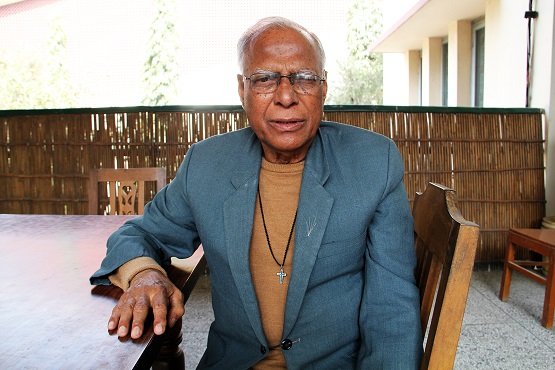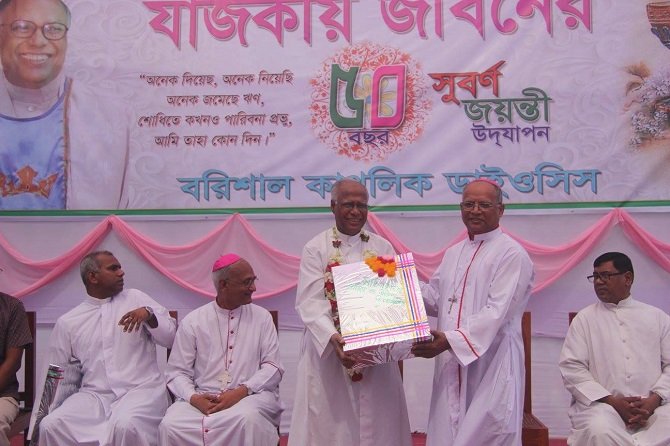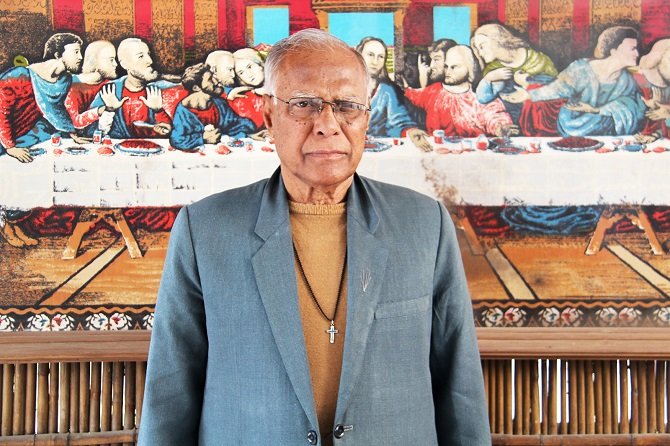Assisting people in distress, his foremost duty as priest
Bangladesh's senior priest talks 50 years of service Father Philip D'Rozario considers assisting people in distress as his foremost duty as priest Bangladesh's senior priest talks 50 years of service.
 Father Philip D'Rozario is a man full of life. He has a welcoming face and a strong, energetic posture as if he could attend a new mission tomorrow. But at the age of 82, Father D'Rozario is unlikely to take up a new adventure. As Bangladesh's most senior diocesan priest with 50 years' experience, he now lives a retired life of prayer and voluntary service in southern Barisal Diocese. Father D'Rozario considers his priestly vocation a "miraculous and merciful act" of God. "I don't have a clear-cut answer [as to] why I decided to become a priest. It was a miracle, an act of God's mercy in my life," he said.
Father Philip D'Rozario is a man full of life. He has a welcoming face and a strong, energetic posture as if he could attend a new mission tomorrow. But at the age of 82, Father D'Rozario is unlikely to take up a new adventure. As Bangladesh's most senior diocesan priest with 50 years' experience, he now lives a retired life of prayer and voluntary service in southern Barisal Diocese. Father D'Rozario considers his priestly vocation a "miraculous and merciful act" of God. "I don't have a clear-cut answer [as to] why I decided to become a priest. It was a miracle, an act of God's mercy in my life," he said.
Father Philip D'Rozario, Bangladesh's most senior diocesan priest, celebrated 50 years in the priesthood in Dhaka. (ucanews.com photo)
His commitment has not gone unrecognized. In December 2016 Father D'Rozario was invited to Rome to join a five-day celebration with nine others celebrating 50 years of ordained life.
Father D'Rozario has worked in parishes, offered spiritual counseling, promoted the priestly vocation, supervised the pastoral retreat center and worked for more than 15 years as vicar general of Chittagong Diocese, which also covered Barisal before it was elevated as a separate diocese.
 A priest in difficult times
A priest in difficult times
After training to be a priest for seven years in Rome and ordained there in 1966, Father D'Rozario's first mission in Bangladesh was working among tribal communities in Bandarban in the southeastern Chittagong Hill Tracts. He remained there for 14 years. "It was a very challenging mission because I had never stayed in the hills before. Food, traveling and communication were very difficult. But I loved working with people [and] played football with young men to encourage them, despite their difficult life," the priest recalled.
Father Philip D'Rozario receives a gift from Holy Cross Bishop Lawrence Subrato Howlader of Barisal Diocese at his 50 years priestly jubilee on Feb. 24. (Photo by Barisal Catholic Diocese)
Father D'Rozario said that the church also suffered through the period of unrest. Militia groups entered tribal villages, snatched money and livestock and forced villagers to work as laborers.
"People were really afraid but they obeyed the militia. We assisted panicked people with money and counseling but it sometimes backfired," he said.
On one occasion, Bengali Muslims saw two militiamen in the house of Harmoni, a Catholic catechist. Harmoni was branded a spy and collaborator.
"A group of soldiers raided the house and detained Harmoni. We tried to prove his innocence but the soldiers didn't listen and they killed the catechist. It was a big tragedy that still hurts," the priest said.
"We supported the struggle of tribal people for their rights but opposed violence. Yet, we were branded as militia-sympathizers and faced continuous pressure from the government and the army," he added.
In hills, Father D'Rozario engaged himself in evangelization among tribal groups, defying Islamic radicals, the local administration and law enforcers.
"Sometimes, Islamic radicals warned me but I didn't cave in. Our Constitution guarantees religious freedom and we were not engaged in forced conversion," he said.
Besides working in the hills, Father D'Rozario served as an assistant pastor in Barisal and Gopalganj districts during and after Bangladesh's war of independence in 1971.
"I have seen how people, especially Hindus, suffered during the war. Many Hindus came to us for survival and we provided shelter. We gave them Christian names, provided Rosary beads and set crosses in their houses. We hid many Hindu women and girls, so the Pakistan Army [could not] take and abuse them," the priest recalled.
"Jesus was innocent, yet he endured suffering for humanity. So, I considered assisting humanity in distress as my foremost duty as a priest," he said.
While working in parishes, he also found concrete ways of empowering poor Christians, both on the hills and in other areas.
"People were extremely poor and most lived hand-to-mouth. I set up several funds for agriculture, business and to save mortgaged properties. These helped people to get rid off poverty and become self-reliant," he said.
The church needs revival
Father D'Rozario said he noticed a lack of vigor and enthusiasm among clergy, religious leaders and laypeople in the church.
"In the past, the church used to be full but [not] anymore because people are busy with work to sustain their lives and to make things more comfortable. Clergy and religious [leaders] are busy in routine work and meetings and they don't have time for pastoral visits," Father D'Rozario said.
Father Philip D'Rozario, Bangladesh's most senior diocesan priest, who recently celebrated 50 years in the priesthood. (ucanews.com photo)
"Christians have a good reputation for education, health and development services but they are less interested in social and political activism. They must take up these challenges," the priest said.


 Votes : 0
Votes : 0









